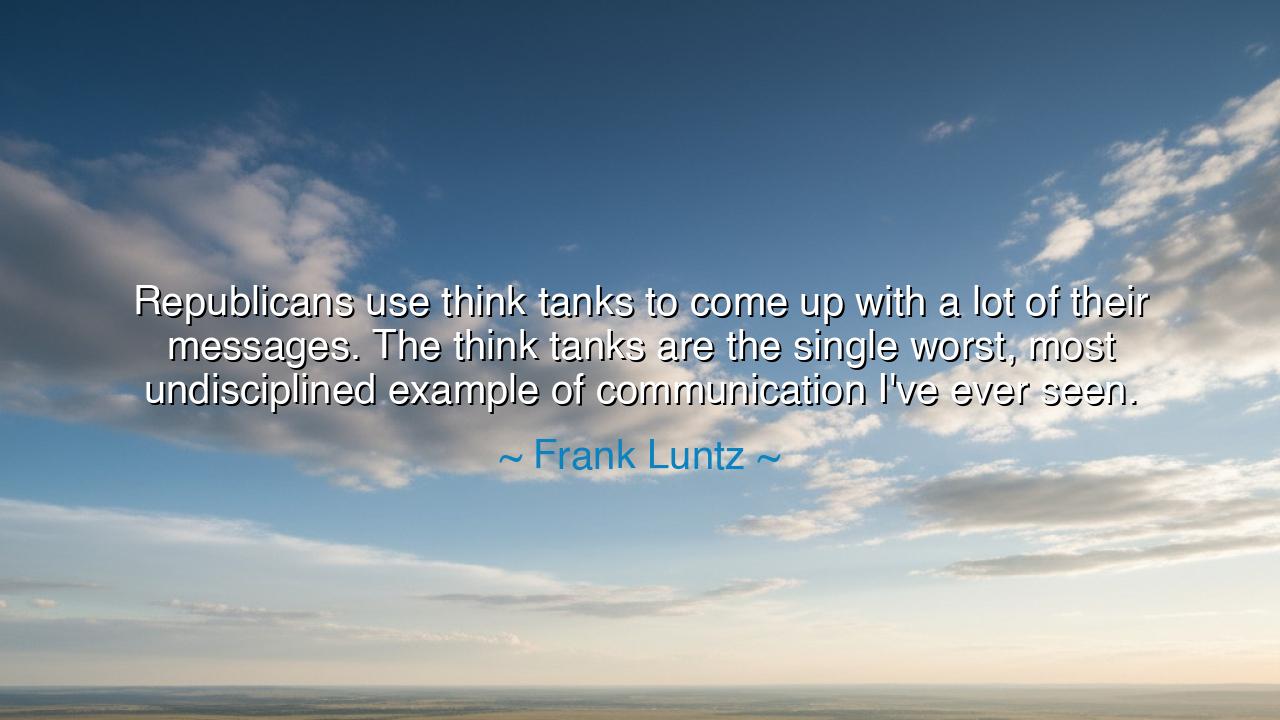
Republicans use think tanks to come up with a lot of their
Republicans use think tanks to come up with a lot of their messages. The think tanks are the single worst, most undisciplined example of communication I've ever seen.






The soft murmur of the café surrounded Jack and Jeeny, the rhythmic tapping of rain against the window blending with the low hum of conversation. Jack sat across from Jeeny, his coffee cup cradled in his hands, staring out at the rain-soaked streets. Jeeny, sitting opposite him, seemed lost in thought, her fingers tracing the rim of her cup.
Host: After a moment of silence, Jeeny spoke, her voice thoughtful, but with a hint of curiosity.
Jeeny: “I came across a quote from Frank Luntz today that made me think about how political messages are shaped. He said, ‘Republicans use think tanks to come up with a lot of their messages. The think tanks are the single worst, most undisciplined example of communication I’ve ever seen.’ What do you think about that? Do you think think tanks really fail in how they communicate, or is Luntz being overly critical?”
Jack: He looked up, a slight furrow crossing his brow. “I think Luntz is hitting on something important. Think tanks have enormous influence on shaping political discourse, but their messages aren’t always as clear or disciplined as they should be. They often get bogged down in strategic language that can be more about manipulation than honest communication. The problem isn’t necessarily the ideas themselves—it’s how they’re packaged and sold. When a message is crafted for political gain, it can lose its integrity and become convoluted.”
Jeeny: “That’s exactly it. Think tanks are supposed to be sources of informed policy ideas and constructive debate, but too often they become tools for spinning narratives that serve specific agendas. The language they use can sometimes be so far removed from reality that it’s almost like they’re speaking a different language. They craft these slogans or catchphrases that don’t really address the heart of the issue, but instead serve to distract or oversimplify.”
Host: The rain outside had softened, leaving a quiet stillness between them. Jack shifted slightly, his fingers still resting on his coffee cup as he continued.
Jack: “It’s not just about crafting messages that sound good—it’s about communication that actually addresses people’s needs, concerns, and understanding. When think tanks become undisciplined in their communication, they miss the opportunity to engage in a genuine conversation. They’re more focused on shaping perception than creating a meaningful exchange. It can alienate people rather than inform them.”
Jeeny: “Right. Communication in politics should be about transparency and clarity, not obfuscation. But think tanks often focus on manipulation, using language that appeals to emotions rather than reason. They try to control how people think about an issue without actually giving them the tools to think critically about it. It’s not just a failure in communication—it’s a failure in trust. When the message feels like it’s been filtered through too many layers of strategy, it loses its connection to the people it’s supposed to represent.”
Host: The conversation seemed to deepen, as both Jack and Jeeny reflected on the role of think tanks in political discourse. Jack set his coffee cup down gently, his expression softening.
Jack: “It’s a delicate balance, isn’t it? On one hand, think tanks play an important role in shaping policy and ideas. But when those ideas are communicated with the intention of manipulating rather than educating, it undermines the entire process. We need more authenticity in political communication, not just clever language designed to win votes or shape opinions.”
Jeeny: Her smile was small but filled with understanding. “Exactly. When communication is driven by a desire for truth and connection, it becomes more powerful. The goal should be to foster understanding, not just to persuade. Think tanks, when used properly, can be a valuable tool in policy development, but when they turn into machines for spin and strategic manipulation, they lose their purpose.”
Host: The rain had stopped completely, leaving the café bathed in soft, golden light. Inside, Jack and Jeeny sat in the realization that communication, especially in politics, needs to be more than just a strategy. Frank Luntz’s words serve as a reminder that when think tanks focus more on manipulating perceptions than fostering understanding, they fail at their most important job—creating meaningful, honest conversations that connect with people.






AAdministratorAdministrator
Welcome, honored guests. Please leave a comment, we will respond soon